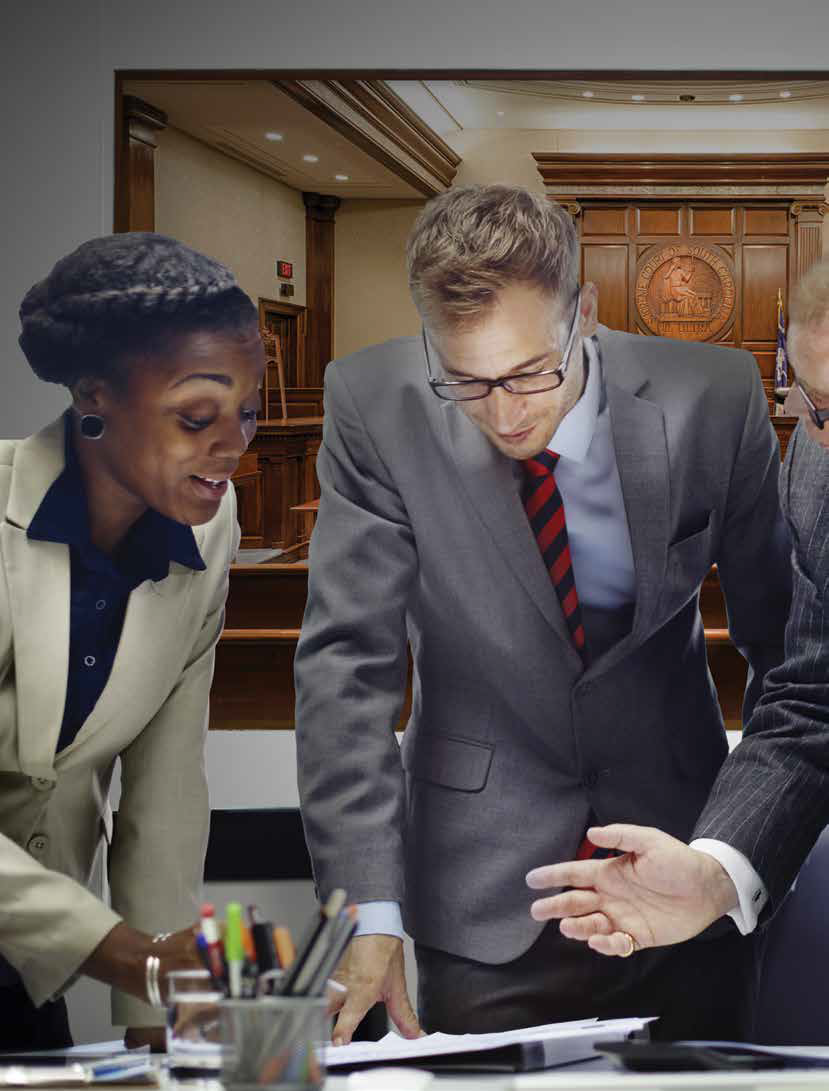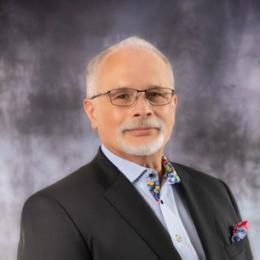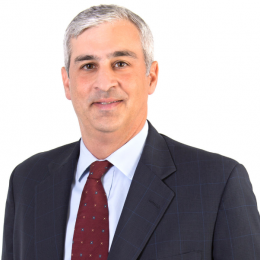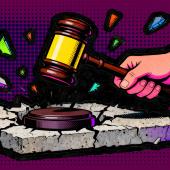
CHEAT SHEET
- Keeping focus. A focus group is a collection of six to 24 people who are selected by a trial consultant to provide an unbiased perspective on the case. This tactic is especially helpful for early case assessments.
- Enter the jury. The five phases of a mock jury are (1) substantial preparation, (2) initial presentation by the trial team, (3) real-time deliberations, (4) post-verdict interviews, and (5) review of the written summary.
- Opening statements. The trial team should prepare for the mock trial as though they are preparing for the trial itself. To get the most accurate results, in-house counsel must treat it as seriously as possible.
- Quality above all. It is important to select a trial consultant who is experienced and qualified. Trial consulting is not regulated or licensed, so it’s important to select the right trial expert.
You can walk the halls of any large law firm in America and find a lawyer in his 70s who can talk about “way back” when he tried upwards of 20 civil cases a year, with several trials per month. But if you want to find a middle-aged lawyer with that same experience, you may have to do a lot more walking.
There are many reasons for this decline. Perhaps the growth of mandatory mediation and skilled mediators has achieved the promise of early dispute resolution. Perhaps the introduction of expensive electronic discovery and time-consuming deposition discovery gives parties their ultimate result without the need for an expensive and time-consuming trial. Perhaps arbitration has become a less expensive, speedier, and more predictable resolution method. Perhaps in-house counsel have become so good at managing cases and minimizing risk that the benefit of a trial rarely outweighs its costs.1
But, regardless of the reasons, it is indisputable that there are fewer trials today.
In 2004, the Journal of Empirical Legal Studies published an examination of trial trend data from 22 states between 1976 and 2002. The report noted that, while the total number of civil cases more than doubled, the total number of civil trials fell 32 percent. This seems to indicate that we are twice as likely to pay the filing fee required to demand our day in court, yet far more likely to settle before that day comes.
And the pendulum has not swung back in the other direction over the last decade. It is widely accepted that since 2009, almost 99 percent of civil cases are resolved before trial.2 For the 12-month period ending Sept. 30, 2015, there were only 4,734 civil trials in federal court (and only 1,882 were jury trials).3 That is a decrease of one more percent from the prior year.
At the same time, the trial consulting industry has emerged into such prominence that Gene Hackman played a trial consultant in the 2003 movie Runaway Jury, and a major network is now broadcasting a television show about trial consultants, Bull. And that’s not entirely welcome publicity. According to at least one real-life trial consultant, David H. Fauss of Magnus Research Consultants, Inc., “We are usually behind the scenes, out of sight, and under a low profile — and we like it that way. It is because of that low profile that we can do our work effectively. Many trial consultants have been worried about the show creating a false impression of the work that they do. But, I am sure that police officers find cop shows to be unrealistic, too. How many lawers felt that L.A. Law, or even Perry Mason, were realistic? None. Any profession portrayed in television or movies has to be fictionalized and sensationalized.”
So, here, we will try to explain what trial consultants really do to prepare for a trial that may never happen, and how they can add value in an era when civil trials are vanishing.
1 Only 7.7 percent of federal cases were terminated by summary judgment in 2000. See Joe S. Cecil, Dean P. Miletech & George Cort, “Trends in Summary Judgment Practice: A Preliminary Analysis,” (Fed. Jud. Ctr. Division of Research Nov. 2001).
2 See Hon. Xavier Rodriguez, U.S.D.J., “The Decline of Civil Jury Trials: A Positive Development, Myth, Or The End of Justice As We Know It?,” 45 St. Mary’s Law Journal 334 (2014).
3 See United States District Courts – Judicial Business 2015 at Table T-1.
Types of jury research exercises and consulting services
Focus groups
A focus group is a collection of six to 24 people carefully screened and selected by the trial consultant from the same jurisdiction where the case is sitting. Smaller focus groups may be called “round tables,” but the methodology is essentially the same. The group members are not told which party is paying them, minimizing the risk that the focus group will tell you what they think you want to hear. And, let’s face it: In-house and outside counsel alike have been known to operate as an echo chamber, where everyone is inclined to advocate for “our” position and we can become blind to different perspectives.
In a typical focus group, you will find a cross-section of America: unemployed people, retirees, stay-at-home parents, and even professionals with non-traditional work schedules (e.g., airline pilots and doctors). Properly recruited participants will be representative of the actual jurors in the trial venue.
They participate in a guided discussion about the entire case or about specific issues within the case that counsel have identified. The focus group may even be asked to evaluate opening statements or trial tools, such as exhibits or slide shows, for clarity and effectiveness. Focus groups offer counsel insight into the actual opinions and predispositions of potential jurors. They can help identify compelling (and futile) arguments.
That is not an insignificant point. Lawyers went to law school to learn to think like lawyers, and then spend much of their career surrounded by lawyers — in the office, at lunch, and at bar functions. It doesn’t hurt anyone to hear different perspectives, particularly when the people with the different perspectives are the ultimate decision makers. For example, there are plenty of very smart political news broadcasters who lacked this perspective in November 2016, when they failed to recognize what the ultimate decision makers — the American voters — were thinking.
Focus groups are especially helpful for early case assessment, for testing unique arguments in a low-risk setting, for guiding the discovery process, and for understanding how a potential jury may react to complex issues (i.e., whether your outside counsel can explain the issues in simplest terms without putting the jury to sleep). If the focus group is run well, the opinions presented can guide the lawyer on discovery hot spots and indicate how best to present the case. It can also provide insight into whether settlement should be reprioritized.
The focus group discussion is moderated by a trained consultant, not your outside counsel. The consultant prepares a list of questions and topics generated with the substantial input of the client and outside counsel. These issues and questions are presented in a neutral, non-adversarial fashion (which is not as easy as it sounds). The moderator, in guiding the discussion, actively encourages group members to express their honest and detailed opinions. A well-trained consultant will be able to pick up on subtle nuances of the participants and question them about those behaviors in real time.
Focus group sessions are almost always recorded on video — which allows counsel to review and evaluate the non-verbal cues and behavior of the participants. And, thanks again to modern technology, you can now edit hours of video into a short video clip that serves as a reality check for the business unit leaders. Sessions like these illuminate how the people who will ultimately resolve this dispute actually think and talk. While we are all skilled advocates who have been trained to present clear options to the business leaders in the limited time made available to us, video can be very compelling to present the risks. And in situations where the lawyers think the case is high risk, but the business unit leaders think the case is worth only nuisance value, it is often helpful to have a neutral party provide feedback to identify who is most likely correct.
This neutral feedback can even provide useful clarity for board decisions, particularly in an era when board members have limited experience choosing whether the business unit leader or the in-house counsel has more accurately predicted what the jury will do.
Mock juries
A mock jury uses an adversarial — instead of a neutral — presentation. It can provide even more detailed information, including not only about how potential jurors perceive a case, but also how they will react to your key witnesses, how they “connect” with your outside counsel, and what the potential exposure will be. Like a focus group, a consultant will interview and choose participants for the mock jury from the same locality where the trial will take place. It is a best practice to have enough mock jurors to generate more than one set of jury deliberations. You may even have your lawyer use a mock voir dire — which is yet another important trial skill that is getting as little attention as regular flossing and exercise due to the limited opportunities available to take a case to trial.
A mock jury uses an adversarial — instead of a neutral — presentation. It can provide even more detailed information, including not only about how potential jurors perceive a case, but also how they will react to your key witnesses, how they “connect” with your outside counsel, and what the potential exposure will be.
The mock jury has five phases:
- Substantial preparation by your trial team and the trial consultant;
- Presentation by your trial team, which often includes the use of video excerpts from depositions taken during discovery;
- Real-time observation of deliberations guided by your trial consultant (employing very much the same style and tactics used with the focus group to help the mock jury stay on task);
- Post-verdict interviews with the participants, either together or separately (to avoid a groupthink dynamic). The questions should gauge what influenced the mock jury’s verdict, how it reached the decision, and how it perceived the lawyer’s presentation; and,
- Review of the written summary and recommendations from your consultant.
The reasons to conduct mock jury research are numerous, according to Dr. Melissa Pigott, a social psychologist and co-founder of Magnus Research: “Essentially, a mock jury involves evaluating liability and damages, but each case has its own challenges, which we consider, alongside our client, when planning the format of the research project.”
No matter how much planning goes in on the front end, the results of the mock jury research are often unpredictable. Every exercise presents at least one mock juror or focus group participant who makes an unexpected observation or reaches a seemingly off-the-wall conclusion. And, just as often, that observation or conclusion gains traction in the minds of the other mock jurors. In-house and outside counsel should disregard this information at their own risk. In-house counsel, in particular, can always learn something from these exercises. Sometimes, it’s about the case; other times, it’s about their outside counsel. And what they learn can be the difference between winning, losing, or approaching a settlement differently.
Conducting a mock trial allows your outside counsel to present both sides of the case. This is especially beneficial because your outside counsel will have to acknowledge your bad facts early on, and present every hot document, bad testimony, and effective argument that the other party is expected of offer. And because lawyers are competitive, the trial team member who agrees to play the role of opposing counsel must be expected to play to win. It may be uncomfortable for in-house counsel to see “their” lawyer punching big holes in the case (and enjoying it), but that discomfort may be one of the most valuable parts of the mock jury exercise.
And this discomfort is not limited to in-house counsel, as video excerpts from depositions will be used during the presentation phase to obtain feedback on the credibility and appeal of all key witnesses. We have all worked with senior-level employees who were not good deponents. It is not easy to tell a senior-level employee that a jury will not like them. And you may find yourself leaving that discussion until much too close to trial. While still awkward, it is much easier, if done tactfully, to forward the employee a video excerpt of unfavorable comments from a handful of mock jurors. As painful as the comments are to hear, if company leadership and other key witnesses can learn from the feedback, future case outcomes (as well as day-to-day business operations and office morale) may improve. That employee can then draw their own conclusions about the risks of trying the case. Similarly, that employee may also feel validated (and, perhaps, enjoy) when viewing video of the mock jurors rejecting the testimony of the opposing party’s key witnesses.
Aside from the feedback about the particular case and witnesses, a mock jury exercise allows an opportunity to evaluate your outside counsel beyond the confines of the office. Are they well prepared? Do they react well on their feet when, inevitably, the plan is imperfect or gets disrupted? Do their oral presentation skills match their exceptional legal writing talent? These are often entirely different skill sets, and your attention must be given to the skills that matter at trial, not just at filing deadlines.
Does the trial team work well together, or do you need to address potential turnover (and its inevitable costs)? Are there signs of efficient staffing, such as younger laywers given opportunities to participate? Are your diversity guidelines being respected? Do the potential jurors like your outside counsel? Trial consultants sometimes find themselves in the awkward middle ground between the trial lawyer and the client, where the client demands an evaluation of the lawyer.
According to Dr. Pigott, “Most often, but not always, if egos can be put aside, both the lawyer and the client will learn something, and will achieve an acceptable outcome from the experience. The evaluation can be critical to building confidence in the trial team or, when the results indicate that the lawyer is not up to the job, that is something the client should know, particularly when the stakes are high.”
The evaluation of outside counsel — both in the presentation and in the preparation — should be a part of the exercise.
At the conclusion of the exercise, a mock jury can help demonstrate to the company decision makers that the case is not as strong as they believe. You may even have to identify a new key witness, something that is never enjoyable, but also much easier to do in advance of a trial rather than during it. In that case, settlement may be made a priority or the trial presentation can be modified. On the other hand, perhaps the case is stronger than the lawyers believed, and settlement negotiations or case strategy should be readdressed. A willingness to reject first impressions is necessary.
Mock jury exercises can also be quite expensive and time consuming. A jury consultant will charge between US$20,000 and US$150,000 — and that is in addition to outside counsel’s legal fees. Focus groups vary in complexity and design, but the typical range is US$20,000 to US$60,000. Mock jury research typically costs US$30,000 to well over US$100,000, depending on variables such as the length of the session, the number of focus group participants, the number of case theories to be tested, and the complexity of case issues. Careful planning is required to keep total costs proportionate to the case. What is appropriate for a US$2.5 million case is likely less than what is required for a case worth US$25 million.
Given the costs of the jury consultant, consideration should be given to finding other sources to contribute. Is there insurance? Is there a trusted codefendant willing to share the cost of the jury consultant? If outside counsel is a true partner, will the law firm consider discounting lawyers’ fees? There is certainly a legitimate basis to make the request: For trial lawyers who have diminishing opportunities to maintain or improve their trial skills “in the field,” a mock jury may be the best way to stay sharp, hone their presentation skills, and get objective feedback from both the mock jurors and in-house counsel. If this is the rare case that goes to trial, there will be plenty of opportunity to truly earn additional fees, perhaps at an increased trial rate or fixed fee.
[T]hese exercises only make sense for a few types of cases: “significant” litigation and recurring litigation. That is, if several trials related to a particular product or contract are expected, the mock jury exercise provides additional data points so that the result of the first trial is not overstated. These points hold significant value for future litigation.
The trial team should prepare for the mock trial as though they are preparing for the case on the merits. Thus, it requires a lot of preparation and practice. And, it is a substantial investment of time and money. As a result, these exercises only make sense for a few types of cases: “significant” litigation and recurring litigation. That is, if several trials related to a particular product or contract are expected, the mock jury exercise provides additional data points so that the result of the first trial is not overstated. These points hold significant value for future litigation.
Thought should be given during periodic planning sessions to develop objective criteria about which kinds of cases deserve a focus group or mock trial. When outside counsel’s preliminary case assessment meets that criteria, the decision regarding whether to incur this cost becomes easier to make.
Mock jury research and focus group projects should result in a written report from the trial consultant that interprets the data obtained from the jury research. The reports typically include a summary of the decision reached by the mock jurors, an analysis of that decision, and any recommendations from the consultant as to how to proceed with the case. A knowledgable consultant will have many years of expertise and, likely, will have more experience with jurors — both mock and actual — than most, if not all, of the members of your trial team. A good consultant should be able to give you the perspective of the ultimate decision makers, untainted by three years of law school.
As a practical matter, the trial consultant will almost certainly want a role later in the case if it doesn’t settle, so you can count on your trial consultant remaining available to talk through the report and give additional informal feedback.
Other case preparation services
In addition to focus groups and mock juries, trial consultants offer other research methods and services, including survey research and jury selection consultation. In cases involving unique issues, high-profile clients, or high-publicity events, a community attitude survey may be worth considering. By evaluating responses of hundreds of respondents to telephone interviews pertaining to selected case issues, consultants can devise statistically-based juror profiles to use in jury selection.
Further, the impressions of these respondents to particular individuals or businesses involved in a case can be critical; it is akin to taking the pulse of the community. For truly informal – and less reliable feedback — you may want to have your outside counsel make a hypothetical presentation to a group of college students. As more experienced people return to college for additional coursework, a group of college students may reflect your jury pool and provide you with some limited feedback at a fraction of the cost of a mock trial or focus group. There is, of course, less confidence that do-it-yourself approaches will provide a truly representative sample of the potential jury pool. The opportunity for unreliable results are increased when a professional jury consultant has not selected the participants.
Although a complete discussion of the use of consultants to provide trial support is beyond the scope of this article, recognize that jury selection consultation is the next opportunity to use your jury consultant. As noted, the opportunities for trial lawyers to select a jury and to try a case are diminished in today’s world. In contrast, most experienced trial consultants are seeing the inside of the courtroom more often than 20 and 30 years ago. The trial consultant is not there to replace outside counsel. Rather, a trial consultant complements the lawyer’s skills by preparing voir dire questions and then helping to observe the responses of the venire members.
So, while your outside counsel is the voice of the client that makes the first impression on the actual jury, the trial consultant is, effectively, the ears of the client, paid to listen and observe while the lawyers earn their money talking.
Other considerations: Jury consultant qualifications
First and foremost, it is important to select a trial consultant who is experienced and qualified. Unlike lawyers, trial consulting is not regulated or licensed. So, as important as it is to select the right outside counsel and the right trial expert, it is equally important to shop for the right trial consultant. Trial consultants must be vetted beyond the receipt of resumes and the review of websites. Education, experience, credentials, and references matter when placing so much responsibility on a consultant in a high-stakes matter. There is too much at stake to accept that all jury consultants are created equal and that selection is merely a roll of the dice. Do your homework.
The homework required to vet a jury consultant is not burdensome. Ask for the academic background of the jury consultant who will lead the exercise. Find out what degrees they have earned. (Relevant fields include psychology, sociology, marketing research, and communications.) You may even want to have your outside counsel ask for proof of education because, unlike hiring a lawyer whose Bar membership is readily confirmed, there are no similar process to verify a jury consultant’s credentials. Ask about their years of experience as a jury consultant, and their familiarity with the subject matter and the trial venue. Ask for referencs — and actually call them. Look for someone who appears to listen to your concerns and is willing to address them or persuade you that your worries are better directed elsewhere. You are hiring the jury consultant to bring their expertise to your team. As with outside counsel, they offer advice and make recommendations, but they are not the final decision maker. As a practical matter, jury consultants will not be on the frontline for any post-litigation fallout. Therefore, in-house counsel must still use their professional judgment on the ultimate case strategy. While a good jury consultant will offer valuable insight about potential juror decision-making, in-house counsel knows the employees and the culture of the company far better. That matters. There comes a time when every lawyer must, to some degree, rely on intuition or a gut feeling to make a final decision. And, if in-house counsel is not confident that they have developed that ability, it may be time to get creative, such as hiring someone who has more substantial trial experience (e.g., a recently retired judge) to make a recommendation after reviewing the jury exercise video and the jury consultant’s report.
No matter what they say on television, on the radio, or even the sides of city buses, all lawyers are uncomfortable with the unknown. With fewer cases going to trial, the trial experience is universally less common and predictable. While a pre-trial jury exercise cannot replicate the actual process, it is about as close as we can get to the real thing.
In a time when cost-cutting measures continue to be praised, we cannot be pennywise and pound foolish. The plaintiffs’ bar, as the recognized entrepreneurs of law practice, use these options regularly. And it is telling that they are often committing their own money for one reason: It is their experience that the information gained is well worth the investment. They like to win and they are buying a competitive advantage. They, too, are experiencing the effect of fewer trials. No matter what they say on television, on the radio, or even the sides of city buses, all lawyers are uncomfortable with the unknown. With fewer cases going to trial, the trial experience is universally less common and predictable. While a pre-trial jury exercise cannot replicate the actual process, it is about as close as we can get to the real thing.
Even if there is no trial, each of these exercises should provide a tool to evaluate settlement, before and during mediation. And since so many cases are resolved at mediation, having an idea of what likely factors will help decide the outcome can only assist in negotiations, particularly if opposing counsel seems less prepared.





